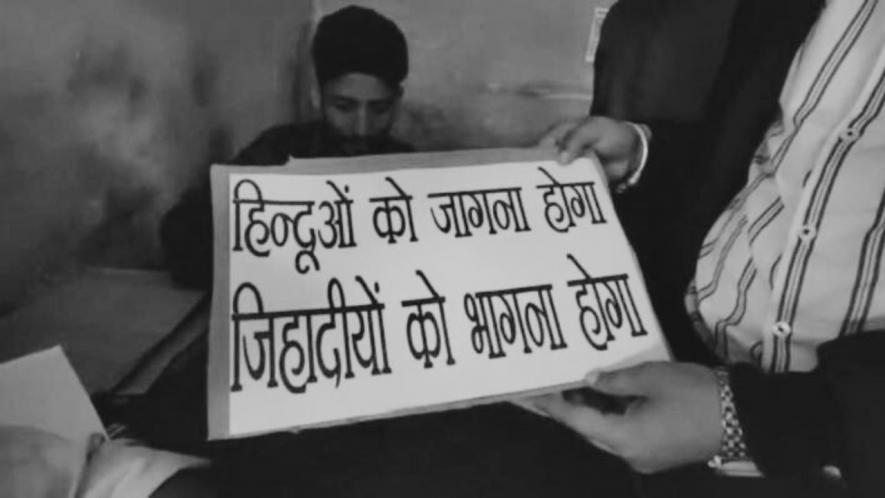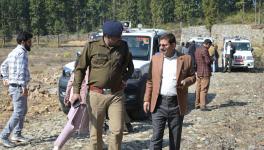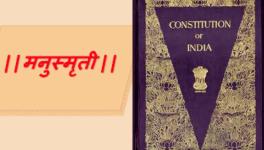Muslims Exodus in Uttarakhand: Tracing a Pattern of Hindutva Hate Machinery

Slowly, the chorus of hate, claiming that Muslims threaten Hindu culture, women and jobs, was manufactured. (File Photo)
New Delhi: An uneasy calm prevails among Muslims in pockets of Uttarakhand, which has of late become a laboratory of Hindutva hate-mongering. This is happening in the wake of false propaganda of ‘Love Jihad’ — wherein a Hindu boy, with the help of his Muslim friend, allegedly abducted a 14-year-old Hindu girl at Purola in Uttarkashi district on May 26. The duo were later arrested, and the minor girl was freed from their custody.
However, it was conveniently forgotten that one of the two men was a Hindu. Under the false alarm of ‘Love Jihad’ — which purports that Muslim men target Hindu women for conversion to Islam by means of feigning love, marriage and kidnapping, etc., venomous slogans, targetting the minority community and labelling them as ‘jihadis’ (crusaders) have become a new normal in the state.
The most common among such slogans are — “Jihadiyon ko jo dega sharan, unki behen betiyon ka hoga haran” (those who give shelter to jihadis, their sisters and daughters will be kidnapped) and Hinduon ko jagana hoga, Jihadiyon ko bhagana hoga” (Hindus need to be awakened, Jihadis need to be chased away).
One such hatemonger is Swami Prabodhanand Giri, notorious for delivering hate speech with apparent brazen impunity. A first information report (FIR) was registered against him following a ‘Dharma Sansad’ (a congregation of Hindu fanatics) held in December 2021 in Haridwar. The event where a call for Muslim genocide was given had drawn global outrage.
But he is not alone; there are several others, such as Rakesh Tomar Uttarakhandi — who, in a video, can be seen threatening Van Gujjars (a Muslim pastoral community) to leave their land by April 10 or be ready to face the consequences.
Surprisingly, instead of acting tough on the hate mongers, who are publicly demonising Muslims and calling for their eviction from ‘Devbhoomi’ (land of gods) of Uttarakhand on different social media platforms, the police registered an FIR against unknown persons under sections 153A (promoting enmity between different groups on the gro
unds of religion, etc.), 505 (statements causing public mischief) and 506 (criminal intimidation) of the Indian Penal Code (IPC) for putting up anti-Muslim posters.
Sensing an apparent threat to their safety and security following the coming up of a poster warning Muslims to leave Uttarakhand or face consequences, Muslims in the Himalayan state, unable to fight back and trust the local police administration, continue to flee their homes they have lived in for generations and abandoning their livelihoods.
“The shop owner is pressured us to vacate his shop by June 15. Left with no option, we had to vacate — leaving everything behind. We have our homes here for decades. The challenge before us is where to go and what to do,” said Mohammad Salim while vacating his shop in Purola.
Among those who fled the area was Gulshan, wife of Mohammad Zahid — district minority welfare officer.
“Everyone knows why we left and are leaving,” she said, refusing to reply to further questions.
A PATTERN OF THE HATE CAMPAIGN
Does the latest case — which should have been treated like any other crime and needed police action — follow any pattern? The answer is — apparently yes if locals and previous incidents are considered.
Activists and rights groups trace it to the continued persecution of van gujjars, a nomadic group of cattle herders inhabiting the foothills of Himalayan states such as Uttarakhand, Himachal Pradesh and Jammu and Kashmir.
The tribe, like other tribes, heavily depend on forests for centuries. It also keeps moving livestock from one place to another, depending on the change in seasons. Since van gujjars are predominantly Muslims, local Hindutva groups began “targetting them in the name of outsiders and encroachers.” The rhetoric gained strength when organisations such as the Vishwa Hindu Parishad (VHP) and the Bajrang Dal fuelled the campaign.
A new phrase of ‘Land Jihad’ was coined to target the community. Under alleged pressure from right-wing groups, the state administration, with an alleged bias against the forest dwellers, began removing van gujjars from forests on one pretext or the other even after over a decade of the passing of the Scheduled Tribes and Other Traditional Forest Dwellers (Recognition of Forest Rights) Act, 2006 (FRA).
Section 3 (1) of the legislation gives forest rights even within “protected areas” to the communities classified as the Scheduled Tribes (ST) and Other Forest Dwelling Communities. They also have the right to manage and conserve forests and wildlife areas under Section 5 of the Act.
Section 4(5) of the law clearly states that forest dwellers cannot be evicted without the process of recognition of rights having been completed and that the rights have already been vested with them.
Declaring the van gujjars a “constant threat to the wildlife”, the Uttarakhand High Court, on August 16, 2018, ordered their removal from the Jim Corbett National Park.
After forest rights activist Tarun Joshi approached the Supreme Court against the order, there has been a status quo on the High Court’s order since September 10, 2018.
The fate of hundreds of such families depends on the top court’s final decision.
Interestingly, the same division bench of the Uttarakhand High Court comprising justices Lok Pal Singh and Rajiv Sharma, who had ordered the eviction, hearing a public interest litigation (PIL) in July this year, declared “the entire animal kingdom” as a legal entity with rights, duties and liabilities of a living person as “persons in loco parentis as the human face for the welfare/protection of animals”.
Van gujjars largely reside in the tarai (lowland) regions of Uttarakhand, such as Haridwar and Uddham Singh Nagar. They are also there in the hilly regions of the state, such as Uttarkashi, Nainital, and Tehri. When the “protected areas” (wildlife sanctuary, etc.) concept was implemented, many of the transit routes of the community were blocked. As a result, they resettled themselves in the Kumaon region, which consists of a large Himalayan tract.
In compliance with an apex court order in 1997, at least 1,500 van gujjar families were rehabilitated in the Gandi Khata and Pathri areas of Haridwar.
The van gujjars in the Garhwal region are still nomads and keep shifting their dwellings from one grazing field to another.
The state has around 35,000 families of the nomadic tribe.
Explaining the continued persecution of Muslims in the state, Joshi — who heads Van Panchayat Sangharsh Morcha, told NewsClick, “The state government has come up with new legislations intending to ensure that Muslims cannot buy land in the state. The propaganda of ‘Land Jihad’ was coined, and it was validated by the chief minister, Pushkar Singh Dhami, who also said the state is witnessing a ‘demographic change’.”
Talking to the media, Dhami recently said his government “will not allow Uttarakhand to become a soft target for love jihad, which has witnessed a rise over the last few months”.
He further said the government won’t allow land in the state to be used for “encroachment”.
It had a wider ramification in the state, said Joshi, adding that bulldozers rolled out thousands of houses in the name of “illegal construction”.
“District police chiefs were asked to furnish details of government lands, which have been allegedly encroached upon. Surprisingly, complying with the order, the reports that were submitted had details of Hindu and Muslim dwellers of the alleged encroached lands. And as a result, areas with higher Muslim concentration were cleared,” he alleged.
One such report has been accessed by NewsClick, which corroborates the allegation. Sent to the Director General of Police on April 28, the report by the office of the Senior Superintendent of Police, Nanital, mentions the religious identification of the alleged encroachers in the column that asks “who has encroached upon”.
Following the success of the ‘Land Jihad’ narrative, another propaganda of ‘Mazar Jihad’ was spread. It’s a government-supported campaign against the ancient graves of Sufi saints across the state. Alleging that the shrines have been constructed on government lands to grab it, right-wing groups were given a free hand to demolish several of them.
Some ruckus on these lines has often been witnessed in the state in the recent past.
Meer Hamza, who works for the rights of van gujjars, said the narratives are not new.
“When Dhami was the MLA, he raised these issues several times. When he became the chief minister, local Hindutva groups got a hearing. The radical local proxies of the BJP now began doing the groundwork for communal polarisation. The result is before everyone else,” he said.
After local groups such as the Yamuna Ghati Hindu Jagriti Sangathan led local-level protests, he said larger groups — the Hindu Yuva Vahini, the Bajrang Dal and the Vishwa Hindu Parishad (VHP) — joined in to take the agitation on on a bigger scale and make the false narratives of ‘Love Jihad’, Land Jihad, ‘Mazar Jihad’, etc., part of the discourse.
Slowly, the chorus of hate, claiming that Muslims threaten Hindu culture, women and jobs, was manufactured. “It got the support of the government, which is in hand in gloves,” he alleged.
The ‘outsider’ rhetoric, he said, is the next element of the hate campaign that has been in public discourse in the state for quite some time.
It is, in fact, a call to keep Muslims, who, according to the right-wing groups, are impure as they eat meat, away from the ‘Devbhoomi’ — which has a number of Hindu pilgrimage sites.
The call has a popular slogan — “Jihadi Bhagao, Devbhoomi Bachao”.
Unfortunately, the High Court, too, seemed to have failed to comply with the Supreme Court’s order dated October 21, 2022, in Shaheen Abdullah vs Union of India (WP(C) 940/2022), where the states of Delhi, Himachal Pradesh and Uttarakhand were specifically directed to “ensure that immediately as and when any speech or any action takes place which attracts offences such as Sections 153A, 153B and 295A and 505 of the IPC etc., suo motu action will be taken to register cases even if no complaint is forthcoming and proceed against the offenders in accordance with law”.
Though an FIR was filed, no one was identified as accused in it despite several hatemongers openly calling for the expulsion of Muslims and their extermination.
Get the latest reports & analysis with people's perspective on Protests, movements & deep analytical videos, discussions of the current affairs in your Telegram app. Subscribe to NewsClick's Telegram channel & get Real-Time updates on stories, as they get published on our website.
























